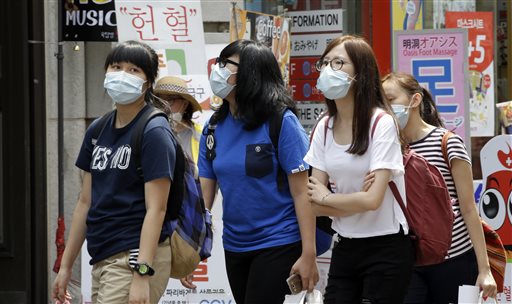
Visitors wearing masks as a precaution against MERS, Middle East Respiratory Syndrome, virus, walk at a shopping district in Seoul, South Korea, Tuesday, June 9, 2015. AP
Amid deepening concerns over the spread of the Middle East respiratory syndrome, foreign residents in South Korea have remained relatively calm, noting MERS fears have escalated partly due to Seoul authorities’ “clumsy” handling of it and excessive media attention.
Some expats pointed out that the government failed to effectively communicate with Koreans as well as foreigners, worsening concerns over MERS, which has killed six of the 87 confirmed cases as of Monday.
“Considering how few have actually been affected, I think there is way too much unnecessary worry from the general public. … The people around me joke more about this than they worry,” said Christina Wilkens, who lives in the Gwangju area.
“From what I have seen, read and heard, the (Seoul) government is handling this rather clumsily, which causes uneasy minds. And of course, there has to be coverage of this, but it has been overhyped.”
Some criticized the Seoul authorities over their communication with the public. Seoul’s Foreign Ministry held a briefing on MERS for embassy staff from more than 110 nations and international organizations for the first time Monday ― nearly 20 days after the first MERS case was confirmed on May 20.
“I think the Korean government‘s failure to communicate with both its own population and foreign states is a serious problem. The media started an unjustified panic and the government allowed it to continue for too long,” said Joe DeMarini from the US.
“And letting patients suspected of being infected or actually being infected wander around outside of quarantine is plain negligent,” he pointed out, adding that he was also not worried about MERS too much as he believes basic hygiene such as hand washing and avoiding unnecessary hospital visits should be enough.
Nina Mosses, from England, pointed out that the emergency text message on prevention measures sent during the weekend was only in Korean.
“It would be useful if the emergency alert sent to your mobile was in English also,” she said.
Mentioning many Koreans wearing masks and becoming extremely reluctant to go to mass gatherings, foreign residents also said the level of concern over MERS was disproportionate, considering the number of deaths caused by road accidents and other diseases.
“Flu and pneumonia kill thousands of Koreans every year, but you never see mass hysteria when flu season rolls around,” said Douglas W. Eaton Tennant from Canada.
During the ministry’s briefing to foreign diplomats, Lee Key-cheol, ambassador for Overseas Koreans and Consular Affairs at Seoul’s Foreign Ministry, underscored Seoul’s determination to combat MERS.
“I was also worried about MERS at the initial stage of its outbreak,” he said during his opening remarks.
“However, when I came to know more about the disease with updated information about the analysis of the samples of the disease conducted by Korea, the U.S. and the Netherlands, I came to the conclusion that my worries in the past were groundless, and mainly based on misunderstandings.”
RELATED STORIES
South Korea reports 7th MERS death
DFA: No travel ban yet in S. Korea amid MERS-CoV outbreak